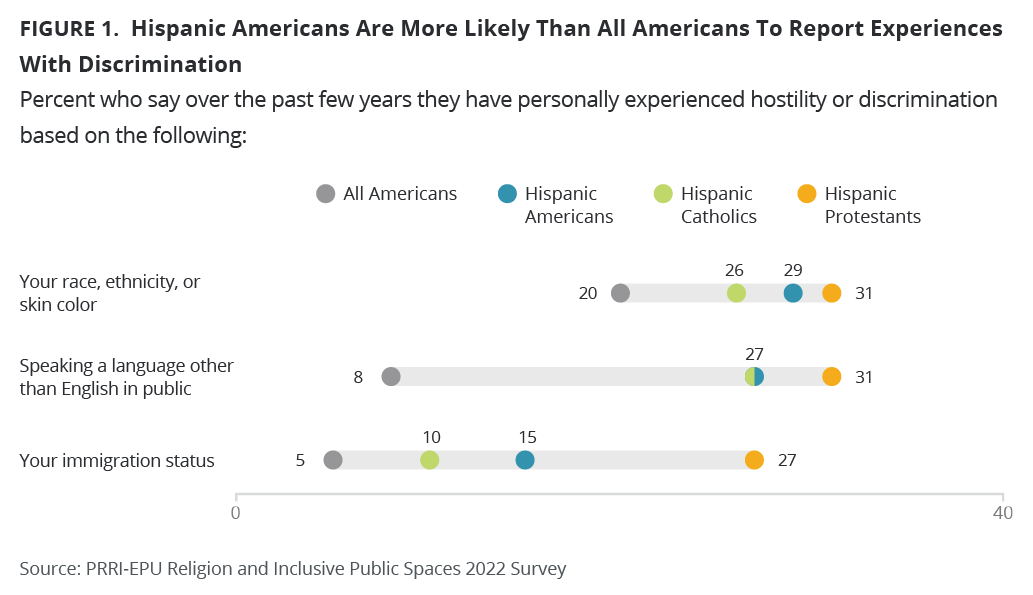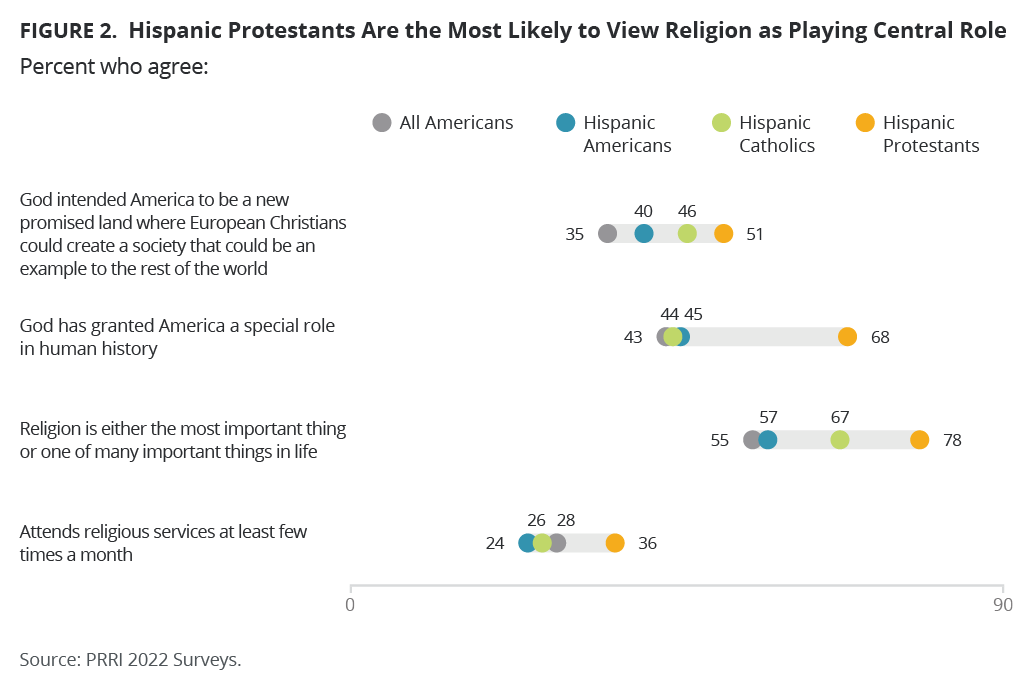National Hispanic Heritage Month takes place every year from September 15 until October 15, celebrating the contributions of Hispanic Americans to the United States. According to the American Community Survey (ACS) in 2021, there are nearly 63 million Hispanics in the U.S. population, which corresponds to 18.9% of the total population. Most Hispanics live in 13 states across the country and are young, with a majority (57%) age 35 or younger.[1] Moreover, about 32% of Hispanics are foreign born, coming mostly from Mexico, Central American, and South American countries. Hispanic Americans are a diverse group with diverse perspectives on the United States and issues the country faces.
Views of the United States and President Biden
Hispanics are a bit more optimistic about the United States than all Americans. A majority of Hispanic Americans (54%) believe that the American culture and way of life has mostly changed for the better since the 1950s, compared to 45% who think it mostly changed for the worse, whereas all Americans are equally divided on this question (49% vs. 50%). Hispanic Catholics are more optimistic, with 59% believing that that American culture has mostly changed for the better, compared to 41% who think it mostly changed for the worse. By contrast, Hispanic Protestants are notably less likely to believe that American culture has mostly changed for the better (37%) and a majority think it has changed for the worse (60%).
Hispanic Americans tend to have more favorable views of President Joe Biden than all Americans. In September of 2021, 65% of Hispanics had a favorable view of Biden compared to 52% of all Americans. Moreover, three in four Hispanic Catholics (75%) had favorable views then.
Views on Discrimination and Racism
In 2021, the vast majority of Hispanic Americans (81%) said there is a lot of discrimination against Hispanics in the country. In 2022, PRRI asked if Americans have personally experienced hostility or discrimination based on their race, ethnicity, or skin color over the past few years. Hispanic Americans (29%) reported experiencing discrimination at a significantly higher rate than all Americans (20%). This remains true for Hispanic Protestants (31%) and Hispanic Catholics (26%).
When asked if they have personally experienced hostility or discrimination based on their immigration status, Hispanic Americans are three times more likely than the average American to say yes (15% versus 5%, respectively). Interestingly, this question yields dramatically different results when broken down by religion: 27% of Hispanic Protestants say they have experienced hostility or discrimination based on their immigration status, compared to only 10% of Hispanic Catholics.
Hispanic Americans (27%) are more likely than any other racial demographic to experience hostility or discrimination due to speaking a language other than English in public. Less than one in ten Americans overall (8%) experience this type of discrimination.

Incidentally, Hispanic Americans (57%) are the only ethnic minority in which a clear majority agree that racial minorities use racism as an excuse more than they should. Only 31% of Black Americans, 48% of AAPI, and 51% of multiracial respondents agree with the same sentiment. Overall, however, Hispanic Americans (57%) are not far from white Americans (61%) or the national average of 56% of Americans who agree that racial minorities use racism as an excuse more than they should.
Views on Book Bans
On the topic of whether books depicting slavery should be banned from being taught in public schools, even though the vast majority of Hispanic Americans oppose such bans (80%), they are less likely to oppose these bans than all Americans (89%).
Opinions on whether books discussing LGBTQ topics should be banned from being taught in public schools mirror those of Americans as a whole. Two-thirds of Americans (66%), and 64% of all Hispanic Americans, oppose banning books discussing LGBTQ topics.
The Role of Religion
Hispanic Americans (40%) are more likely than any other racial demographic to agree that “God intended America to be a new promised land where European Christians could create a society that could be an example to the rest of the world.” Just over one-third of the general American population (35%) agrees with this statement. Christian Hispanics are even more likely to agree with this statement, with 51% of Hispanic Protestants and 46% of Hispanic Catholics saying that God intended America to be a new promised land where European Christians could create a society that could be an example to the rest of the world.
By contrast, when asked whether God has granted America a special role in human history, less than half of Hispanic Americans (45%) and Hispanic Catholics (44%) agree with this statement, similar to all Americans (43%). Hispanic Protestants (68%) overwhelmingly believe that America has a special God-given role in human history.
When asked about the place of religion in their lives, a majority of Americans (55%) and Hispanic Americans (57%) consider religion to be either the most important thing or one of many important things in their life. Yet only 24% of Hispanic Americans say they attend religious services a few times a month or more. Hispanic Protestants (36%) are more likely than Hispanic Catholics (26%) to attend church a few times a month or more.

Community Engagement
On the topic of community engagement, most Hispanic Americans feel satisfied with their involvement with organizations in their communities. Two-thirds of Hispanic Americans (67%) feel satisfied with their involvement in non-religious civic organizations, while one-third feel dissatisfied (32%). Most Hispanic Catholics (65%) also feel satisfied, but a little less satisfied than all Americans (73%).
[1] The 13 states include Arizona, California, Colorado Florida, Georgia, Illinois, New Jersey, New Mexico, New York, North Carolina, Pennsylvania, Texas, and Washington.